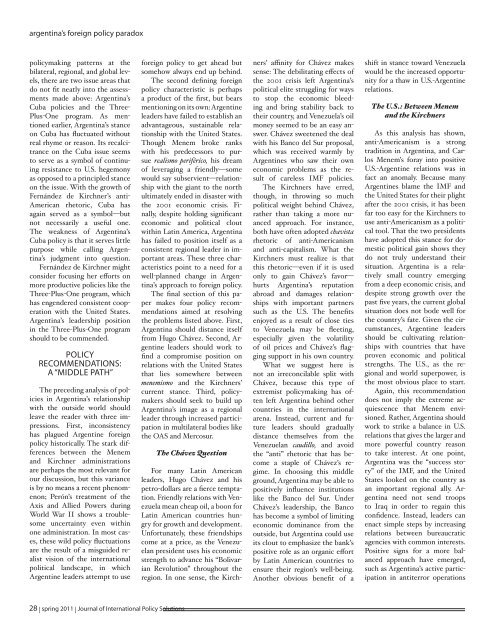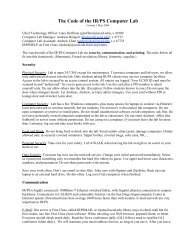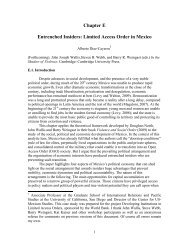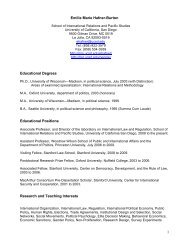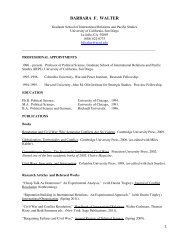to download the full journal. (1.2MB PDF) - School of International ...
to download the full journal. (1.2MB PDF) - School of International ...
to download the full journal. (1.2MB PDF) - School of International ...
Create successful ePaper yourself
Turn your PDF publications into a flip-book with our unique Google optimized e-Paper software.
argentina’s foreign policy paradox<br />
policymaking patterns at <strong>the</strong><br />
bilateral, regional, and global levels,<br />
<strong>the</strong>re are two issue areas that<br />
do not fit neatly in<strong>to</strong> <strong>the</strong> assessments<br />
made above: Argentina’s<br />
Cuba policies and <strong>the</strong> Three-<br />
Plus-One program. As mentioned<br />
earlier, Argentina’s stance<br />
on Cuba has fluctuated without<br />
real rhyme or reason. Its recalcitrance<br />
on <strong>the</strong> Cuba issue seems<br />
<strong>to</strong> serve as a symbol <strong>of</strong> continuing<br />
resistance <strong>to</strong> U.S. hegemony<br />
as opposed <strong>to</strong> a principled stance<br />
on <strong>the</strong> issue. With <strong>the</strong> growth <strong>of</strong><br />
Fernández de Kirchner’s anti-<br />
American rhe<strong>to</strong>ric, Cuba has<br />
again served as a symbol—but<br />
not necessarily a useful one.<br />
The weakness <strong>of</strong> Argentina’s<br />
Cuba policy is that it serves little<br />
purpose while calling Argentina’s<br />
judgment in<strong>to</strong> question.<br />
Fernández de Kirchner might<br />
consider focusing her efforts on<br />
more productive policies like <strong>the</strong><br />
Three-Plus-One program, which<br />
has engendered consistent cooperation<br />
with <strong>the</strong> United States.<br />
Argentina’s leadership position<br />
in <strong>the</strong> Three-Plus-One program<br />
should <strong>to</strong> be commended.<br />
POLICY<br />
RECOMMENDATIONS:<br />
A “MIDDLE PATH”<br />
The preceding analysis <strong>of</strong> policies<br />
in Argentina’s relationship<br />
with <strong>the</strong> outside world should<br />
leave <strong>the</strong> reader with three impressions.<br />
First, inconsistency<br />
has plagued Argentine foreign<br />
policy his<strong>to</strong>rically. The stark differences<br />
between <strong>the</strong> Menem<br />
and Kirchner administrations<br />
are perhaps <strong>the</strong> most relevant for<br />
our discussion, but this variance<br />
is by no means a recent phenomenon;<br />
Perón’s treatment <strong>of</strong> <strong>the</strong><br />
Axis and Allied Powers during<br />
World War II shows a troublesome<br />
uncertainty even within<br />
one administration. In most cases,<br />
<strong>the</strong>se wild policy fluctuations<br />
are <strong>the</strong> result <strong>of</strong> a misguided realist<br />
vision <strong>of</strong> <strong>the</strong> international<br />
political landscape, in which<br />
Argentine leaders attempt <strong>to</strong> use<br />
foreign policy <strong>to</strong> get ahead but<br />
somehow always end up behind.<br />
The second defining foreign<br />
policy characteristic is perhaps<br />
a product <strong>of</strong> <strong>the</strong> first, but bears<br />
mentioning on its own: Argentine<br />
leaders have failed <strong>to</strong> establish an<br />
advantageous, sustainable relationship<br />
with <strong>the</strong> United States.<br />
Though Menem broke ranks<br />
with his predecessors <strong>to</strong> pursue<br />
realismo periférico, his dream<br />
<strong>of</strong> leveraging a friendly—some<br />
would say subservient—relationship<br />
with <strong>the</strong> giant <strong>to</strong> <strong>the</strong> north<br />
ultimately ended in disaster with<br />
<strong>the</strong> 2001 economic crisis. Finally,<br />
despite holding significant<br />
economic and political clout<br />
within Latin America, Argentina<br />
has failed <strong>to</strong> position itself as a<br />
consistent regional leader in important<br />
areas. These three characteristics<br />
point <strong>to</strong> a need for a<br />
well-planned change in Argentina’s<br />
approach <strong>to</strong> foreign policy.<br />
The final section <strong>of</strong> this paper<br />
makes four policy recommendations<br />
aimed at resolving<br />
<strong>the</strong> problems listed above. First,<br />
Argentina should distance itself<br />
from Hugo Chávez. Second, Argentine<br />
leaders should work <strong>to</strong><br />
find a compromise position on<br />
relations with <strong>the</strong> United States<br />
that lies somewhere between<br />
menemismo and <strong>the</strong> Kirchners’<br />
current stance. Third, policymakers<br />
should seek <strong>to</strong> build up<br />
Argentina’s image as a regional<br />
leader through increased participation<br />
in multilateral bodies like<br />
<strong>the</strong> OAS and Mercosur.<br />
The Chávez Question<br />
For many Latin American<br />
leaders, Hugo Chávez and his<br />
petro-dollars are a fierce temptation.<br />
Friendly relations with Venezuela<br />
mean cheap oil, a boon for<br />
Latin American countries hungry<br />
for growth and development.<br />
Unfortunately, <strong>the</strong>se friendships<br />
come at a price, as <strong>the</strong> Venezuelan<br />
president uses his economic<br />
strength <strong>to</strong> advance his “Bolivarian<br />
Revolution” throughout <strong>the</strong><br />
region. In one sense, <strong>the</strong> Kirchners’<br />
affinity for Chávez makes<br />
sense: The debilitating effects <strong>of</strong><br />
<strong>the</strong> 2001 crisis left Argentina’s<br />
political elite struggling for ways<br />
<strong>to</strong> s<strong>to</strong>p <strong>the</strong> economic bleeding<br />
and bring stability back <strong>to</strong><br />
<strong>the</strong>ir country, and Venezuela’s oil<br />
money seemed <strong>to</strong> be an easy answer.<br />
Chávez sweetened <strong>the</strong> deal<br />
with his Banco del Sur proposal,<br />
which was received warmly by<br />
Argentines who saw <strong>the</strong>ir own<br />
economic problems as <strong>the</strong> result<br />
<strong>of</strong> careless IMF policies.<br />
The Kirchners have erred,<br />
though, in throwing so much<br />
political weight behind Chávez,<br />
ra<strong>the</strong>r than taking a more nuanced<br />
approach. For instance,<br />
both have <strong>of</strong>ten adopted chavista<br />
rhe<strong>to</strong>ric <strong>of</strong> anti-Americanism<br />
and anti-capitalism. What <strong>the</strong><br />
Kirchners must realize is that<br />
this rhe<strong>to</strong>ric—even if it is used<br />
only <strong>to</strong> gain Chávez’s favor—<br />
hurts Argentina’s reputation<br />
abroad and damages relationships<br />
with important partners<br />
such as <strong>the</strong> U.S. The benefits<br />
enjoyed as a result <strong>of</strong> close ties<br />
<strong>to</strong> Venezuela may be fleeting,<br />
especially given <strong>the</strong> volatility<br />
<strong>of</strong> oil prices and Chávez’s flagging<br />
support in his own country.<br />
What we suggest here is<br />
not an irreconcilable split with<br />
Chávez, because this type <strong>of</strong><br />
extremist policymaking has <strong>of</strong>ten<br />
left Argentina behind o<strong>the</strong>r<br />
countries in <strong>the</strong> international<br />
arena. Instead, current and future<br />
leaders should gradually<br />
distance <strong>the</strong>mselves from <strong>the</strong><br />
Venezuelan caudillo, and avoid<br />
<strong>the</strong> “anti” rhe<strong>to</strong>ric that has become<br />
a staple <strong>of</strong> Chávez’s regime.<br />
In choosing this middle<br />
ground, Argentina may be able <strong>to</strong><br />
positively influence institutions<br />
like <strong>the</strong> Banco del Sur. Under<br />
Chávez’s leadership, <strong>the</strong> Banco<br />
has become a symbol <strong>of</strong> limiting<br />
economic dominance from <strong>the</strong><br />
outside, but Argentina could use<br />
its clout <strong>to</strong> emphasize <strong>the</strong> bank’s<br />
positive role as an organic effort<br />
by Latin American countries <strong>to</strong><br />
ensure <strong>the</strong>ir region’s well-being.<br />
Ano<strong>the</strong>r obvious benefit <strong>of</strong> a<br />
shift in stance <strong>to</strong>ward Venezuela<br />
would be <strong>the</strong> increased opportunity<br />
for a thaw in U.S.-Argentine<br />
relations.<br />
The U.S.: Between Menem<br />
and <strong>the</strong> Kirchners<br />
As this analysis has shown,<br />
anti-Americanism is a strong<br />
tradition in Argentina, and Carlos<br />
Menem’s foray in<strong>to</strong> positive<br />
U.S.-Argentine relations was in<br />
fact an anomaly. Because many<br />
Argentines blame <strong>the</strong> IMF and<br />
<strong>the</strong> United States for <strong>the</strong>ir plight<br />
after <strong>the</strong> 2001 crisis, it has been<br />
far <strong>to</strong>o easy for <strong>the</strong> Kirchners <strong>to</strong><br />
use anti-Americanism as a political<br />
<strong>to</strong>ol. That <strong>the</strong> two presidents<br />
have adopted this stance for domestic<br />
political gain shows <strong>the</strong>y<br />
do not truly understand <strong>the</strong>ir<br />
situation. Argentina is a relatively<br />
small country emerging<br />
from a deep economic crisis, and<br />
despite strong growth over <strong>the</strong><br />
past five years, <strong>the</strong> current global<br />
situation does not bode well for<br />
<strong>the</strong> country’s fate. Given <strong>the</strong> circumstances,<br />
Argentine leaders<br />
should be cultivating relationships<br />
with countries that have<br />
proven economic and political<br />
strengths. The U.S., as <strong>the</strong> regional<br />
and world superpower, is<br />
<strong>the</strong> most obvious place <strong>to</strong> start.<br />
Again, this recommendation<br />
does not imply <strong>the</strong> extreme acquiescence<br />
that Menem envisioned.<br />
Ra<strong>the</strong>r, Argentina should<br />
work <strong>to</strong> strike a balance in U.S.<br />
relations that gives <strong>the</strong> larger and<br />
more powerful country reason<br />
<strong>to</strong> take interest. At one point,<br />
Argentina was <strong>the</strong> “success s<strong>to</strong>ry”<br />
<strong>of</strong> <strong>the</strong> IMF, and <strong>the</strong> United<br />
States looked on <strong>the</strong> country as<br />
an important regional ally. Argentina<br />
need not send troops<br />
<strong>to</strong> Iraq in order <strong>to</strong> regain this<br />
confidence. Instead, leaders can<br />
enact simple steps by increasing<br />
relations between bureaucratic<br />
agencies with common interests.<br />
Positive signs for a more balanced<br />
approach have emerged,<br />
such as Argentina’s active participation<br />
in antiterror operations<br />
28 | spring 2011 | Journal <strong>of</strong> <strong>International</strong> Policy Solutions


